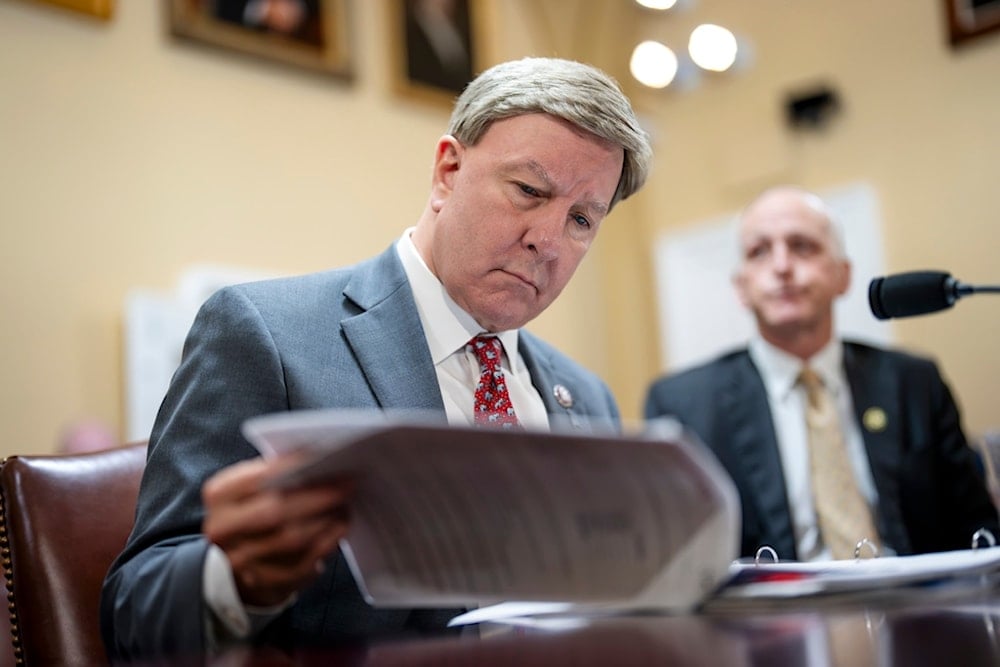Republicans propose $150Bln bill featuring Trump's Golden Dome plan
Unlike the Iron Dome, which is primarily designed to intercept short-range threats, the Golden Dome envisions multi-layered protection, targeting everything from ballistic missiles to hypersonic weapons and advanced cruise missiles.
-

House Armed Services Chairman Mike Rogers, R-Ala., and Rep. Adam Smith, D-Wash., right, the ranking member, listen as the House Rules Committee prepares to advance the fiscal 2024 National Defense Authorization Act, at the Capitol in Washington, Tuesday, June 11, 2024 (AP Photo/J. Scott Applewhite)
The National Interest on Tuesday reported that Republican lawmakers introduced a $150 billion defense package, including $25 million to launch President Donald Trump's "Golden Dome" air defense system.
Designed to replicate and expand on "Israel's" Iron Dome, the Golden Dome project aims to give the continental United States its first full-scale domestic missile and drone defense shield.
Unlike the Iron Dome, which is primarily designed to intercept short-range threats, the Golden Dome envisions multi-layered protection, targeting everything from ballistic missiles to hypersonic weapons and advanced cruise missiles. The system would integrate space-based sensors, new interceptors, and satellite tracking to cover the vastly larger US territory.
"This legislation is a historic investment of $150 billion to restore America's military capabilities and strengthen our national defense," said House Armed Services Committee Chairman Mike Rogers, R-Ala.
"America's deterrence is failing, and without a generational investment in our national defense, we will lose the ability to defeat our adversaries. With this bill, we have the opportunity to get back on track and restore our national security and global leadership."
Defense Overhaul
Concerns over the surge in drone and missile use have added urgency to the effort. Although US taxpayers have long helped fund "Israel's" layered defense systems, a Breaking Defense report pointed out that similar technologies have not been adapted for American domestic defense.
Trump's Golden Dome is meant to fill that void, offering the United States a homegrown shield against airborne threats. Given the vast geographical size of the US compared to Israeli-occupied Palestine, building the Golden Dome will require a massive and costly infrastructure, with full development expected to span years and involve cutting-edge technologies.
Leading defense companies such as SpaceX, Palantir, and Anduril are reportedly expected to play key roles in building parts of the system, including the launch of up to 1,000 satellites to assist missile detection and tracking.
President Trump, speaking earlier this year, said, "As a first step, I'm asking Congress to fund a state-of-the-art Golden Dome Missile Defense Shield to protect our homeland—all made in the USA."
Read more: SpaceX leads bid for Trump’s 'Golden Dome' missile shield: Reuters
Fleet Restoration
Beyond the air defense component, the $150 billion bill allocates significant funding for space technologies, emerging cyber capabilities, and the revitalization of naval shipbuilding, all areas where US military readiness has faced delays and setbacks.
Shipbuilding has become an especially critical concern, with significant delays affecting the production of submarines, frigates, destroyers, and aircraft carriers. In response, President Trump vowed to rebuild America's shipbuilding strength, stating, "We used to make so many ships. We don't make them anymore very much, but we're going to make them very fast, very soon. It will have a huge impact to further enhance our national security."
However, the challenges extend beyond funding. A report from the US Naval Institute pointed out that labor shortages, especially among welders, electricians, and shipfitters, continue to cripple shipyard output.
Experts have stressed the urgent need to raise wages and improve retention in order to restore the nation's ability to maintain and expand its naval fleet.
Read more: US Navy faces crisis as only 13 of 32 amphibious ships ready for duty
The Golden Dome initiative, part of Trump's broader push to rebuild US defense infrastructure, thus signals a major shift toward homeland protection using advanced missile defense technologies, while also attempting to revitalize America's industrial base to meet growing security demands in a rapidly changing global landscape.

 4 Min Read
4 Min Read










